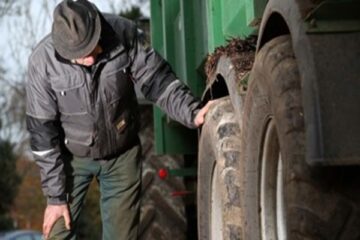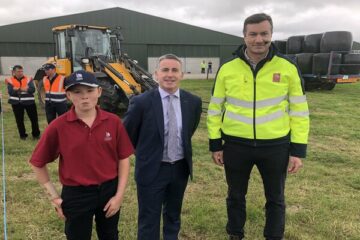One of the most prevalent causes of fire in an agricultural setting is electricity, which also presents other threats.
Farming areas must be regularly checked for any frayed or damaged cables. Place leads and cables in positions where they will be safe from damage and farmers must ensure that they do not use domestic standard sockets, plugs or switches in farm installations.
One danger that is often publicised, but cannot be overstated, is that posed by overhead powerlines and cables. Contractors and other persons entering should always be made aware of the presence of and the location of overhead power lines. Check ground clearance before passing underneath lines and keep well away from any fallen lines, which should be reported immediately to ESB Networks.
Other precautions in relation to power lines
- Never operate high machinery or equipment under or near power lines
- Check for adequate clearance before passing underneath
- Prevent dangers by diverting machines using barriers etc
- Never stack materials under power lines
- Do not burn material or start fires near overhead lines or supporting poles or masts
- If spreading slurry, keep it away from power lines and poles
- Keep animals and other people well away from cables and power lines should they fall
Other electrical risks
Circuit faults and overloads are another potential hazard so ensure that miniature circuit breakers are put in place to- protect the circuit from a fault or overload. Ensure all your fittings are done by a certified electrical contractor and are monitored regularly.
As stated above, domestic plugs and sockets are not suitable to use on farms, any plugs or sockets must be appropriate to the voltage of the equipment they are catering for.
In terms of earthing, all exposed metal parts must be earthed and protective conductors for earthing must be of sufficient size and properly installed. They must also be properly protected and maintained. This is vital if safety devices such as fuses or circuit breakers are to work properly. Ensure that your earthing circuits are tested by a certified electrical contractor.
Electric welders
A commonly needed tool, farmers must ensure that welders are powered by separate circuits and that plugs and sockets used be of the adequate 32 amps variety. An RCD (30mA) fault setting must also be provided. Any exposed conductive parts of the welder must be bonded together and secured to the welder protective conductor. The return conductor cable should be connected to the work piece of the cable using a proper clamp. At all times, user’s eyes must be protected by a suitable filter lens contained in a welding helmet or hand-held shield, which protects the face and neck. Hands and forearms must also be protected by suitable gloves etc.
Generators
Any portable generators must have industrial grade sockets (IEC 309) located on the generator frame for connection. Generators supplying any installations that are permanently wired need to have mechanically interlocked switching facilities between ESB and generator supplies. With each supply clearly marked.



